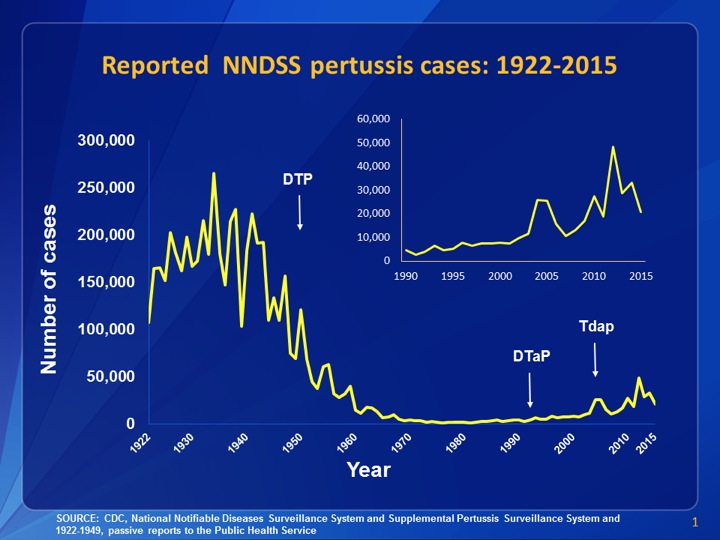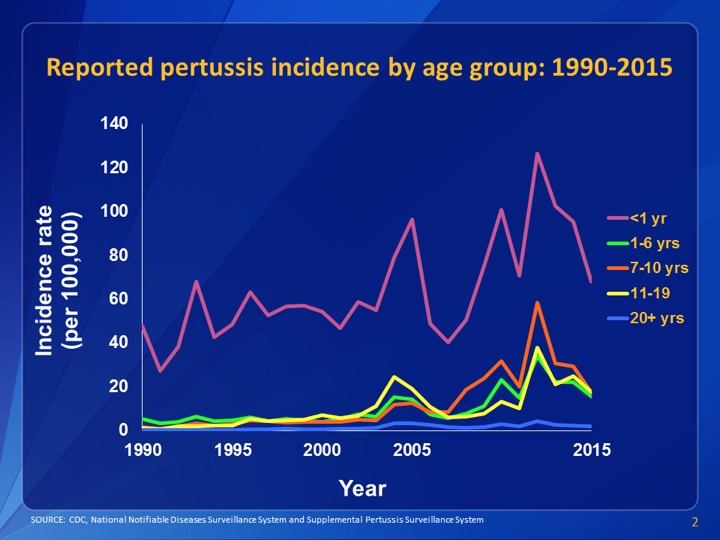
Every semester, I would start my lecture on Bordetella pertussis by playing the sound of a baby with whooping cough - loudly and for a long enough time that my students almost couldn't bear to listen to it anymore.
The sound of a baby that cannot breathe is one of the most upsetting sounds imaginable and I hope that, by listening to it, they gained an appreciation of how horrific whooping cough can be. Of course, we then would shut the sound off and go on with our lecture - something that a parent of an infant with whooping cough cannot do.
If you want to listen to it, and I encourage you to, click here. If you want to fully understand what whooping cough does to infants, watch this video of a baby whooping. (My fantasy is to be able to show this to every person who supports the anti-vaccine movement.)
Whooping cough is caused by the bacterium Bordetella pertussis. It is called whooping cough because of the characteristic whooping sound that is made when people suffering from it cannot breathe, and gasp for air in the middle of the coughing bouts. The coughing routinely ends in the person throwing up.
Whooping cough is sometimes called the "100 day cough" as it lasts a long time - sometimes over two months. Although anyone can get whooping cough, it is especially dangerous in young babies. In fact, if an infant under one year old has whooping cough, there is a 50% chance that they will end up needing hospitalization.
The good news is that there is a great vaccine for Bordetella pertussis. It is one of the three infectious diseases included in the vaccine referred to as either the DTaP or the Tdap. Both the DTaP and the Tdap are effective against three bacterial infections (Diptheria, Tetanus and Pertussis.) The Tdap is given to teens and adults. The DTaP is given to children and is included on the routine immunization schedule, to be given at ages 2, 4, 6 months and then again at 15-18 months and at 4-6 years.
Globally, there are 16 million annual cases of pertussis - leading to 195,000 deaths. In the United States, the number of cases depends on the year. As can be seen in the graphs below, the introduction of the vaccines created a drastic reduction in the amount of cases of whooping cough starting in the 1950s and lasting until the year 2000. Due to the anti-vaccine movement, the numbers have been increasing in the last few years. In fact, in 2012, there were a record number of cases (48,277) in the United States, the highest seen since 1955. The lowest number of cases was in 1976, roughly 1000, representing a 48 fold increase between then and 2012.


As can be seen in the second graph, the cohort with the largest increase in cases are babies under one year old. And, as with most infectious agents, the first few months before the first vaccine dose can be administered are when the newborn is most vulnerable.
To this end, the Centers for Disease Control (CDC) and the Prevention's Advisory Committee on Immunization Practices (ACIP) began a new public health measure in February 2013 that recommended every pregnant women receive the Tdap between the 27th - 36th week of pregnancy. The idea behind this is to boost the mother's immunity during the end of her pregnancy so that her antibodies will be transferred to the newborn. Indeed, it has been shown that infants born to mothers who have been boosted during pregnancy receive a high level of their mother's antibodies. These antibodies will help protect the newborn babies until they receive their own round of vaccines, and most importantly, through their most vulnerable period of the first couple of months.
Although the safety of receiving the Tdap in pregnancy has been well established, the efficacy has not been well studied. However, a new report in Pediatrics has recently shown that an expectant mother receiving the vaccine is 91.4% effective in protecting her baby in the first two months of life and 69.0% over the entire first year. Therefore, having an expecting mothers receive a Tdap vaccine is incredibly effective for preventing whooping cough in infants, particularly in the first two months of life.
References:
1) https://www.cdc.gov/pertussis
2) Baxter R, Bartlett J, Fireman B, et al. Effectiveness of Vaccination During Pregnancy to Prevent Infant Pertussis. Pediatrics. 2017;139(5):e20164091



